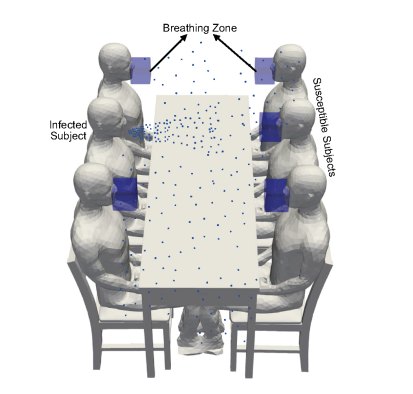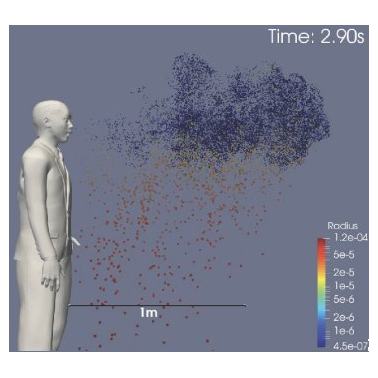| Prize Awarded for Computer Model of COVID Airborne Spread |
| Written by Sue Gee |
| Sunday, 28 November 2021 |
|
The 2021 ACM Gordon Bell Special Prize for High Performance Computing has been awarded to a six-member team from Japan for a novel aerosol simulation methodology investigating how COVID-19 might spread from person to person via aerosolized droplets. In April 2020, in response to the worldwide spread of COVID-19, the Japanese government made Fugaku, the world’s fastest supercomputer, available to scientists working to combat the epidemic. Building on existing industrial particle modelling software, the Japanese research team, Kazuto Ando, Rahul Bale, Chunggang Li, Satoshi Matsuoka, Keiji Onishi and Makoto Tsubokura, all affiliated to the RIKEN Center for Computational Science, employed Fugaku to run a variety of simulations of how COVID-19 might spread from person to person via aerosolized droplets. Their methodology allowed the simulations to scale massively with the high resolution required for micrometer virus-containing aerosol particles, while also achieving an extremely rapid time-to-solution. These simulations included real-world settings of public areas such as classrooms, concert halls, restaurants, commuter trains, and airports. In the paper Digital transformation of droplet/aerosol infection risk assessment realized on “Fugaku” for the fight against COVID-19 the team states: Our work best can be summarized as contributing towards COVID-19 transmission mitigation using supercomputers from three perspectives: performance, in that whole machine scalability and efficiency as well as orders of magnitude speedup in digital twin mesh generation was achieved, technology, in that a these being the result of the new CFD method combined with Fugaku/A64FX’s HPC application-centric design, and science and societal impact in achieving transformational epidemiological simulation of droplets/aerosols and impacted the entire Japanese society’s behavior to curtail the COVID-19 pandemic. This is the second time there has been a ACM Gordon Bell Special Prize to recognize outstanding research achievement toward the understanding of the COVID-19 pandemic through the use of high performance computing. The 2020 award went to a team led by Computational Chemist Rommie Amero at from the University of California San Diego and Arvind Ramanathan, computational biologist at Argonne National Laboratory for work on modeling an all-atom SARS-CoV-2 virus and the virus’s spike protein to understand how it behaves and gains access to human cells. Described as a first-of-its-kind feat, the team built a workflow based on artificial intelligence (AI) to more efficiently simulate the spike, and scaled the workflow to the Summit supercomputer at the Oak Ridge National Laboratory to gain a deeper understanding of the spike’s mechanisms and accelerate the search for therapeutics or vaccines that might work to mitigate the virus. Now Amaro, along with a team of 52 from partners across the US and around the world, including Oak Ridge National Laboratory, has modeled the delta virus inside an aerosol for the first time, again using Summit to simulate the models. Summit is one of the few supercomputers in the world capable of performing these large-scale simulations, which allowed researchers to see aerosols at an unprecedented one billion atoms. Amaro's research that was among the finalists for this year's ACM Gordon Bell Prize and here is her presentation for this year's Supercomputing conference, SC21. Our work dramatically extends the capabilities of multiscale computational microscopy to address the significant gaps that exist in current experimental methods, which are limited in their ability to interrogate aerosols at the atomic/ molecular level and thus obscure our understanding of airborne transmission. We demonstrate how our integrated data-driven platform provides a new way of exploring the composition, structure, and dynamics of aerosols and aerosolized viruses, while driving simulation method development along several important axes. We present a series of initial scientific discoveries for the SARS-CoV-2 Delta variant, noting that the full scientific impact of this work has yet to be realized. The impact of this work goes beyond the immediate needs of learning as much as possible about how SARS-CoV-2 operates to show computer models of aerosols can have wide-ranging impacts, including climate science and human health. According to Dr. Robert “Chip” Schooley, a professor in the Department of Medicine at UC San Diego School of Medicine: “What we learned during the pandemic is that aerosols were one of the main drivers in spreading the virus and that their importance in the transmission of many other respiratory pathogens has been systematically underappreciated. The more we learn about aerosols and how they host viruses and pollutants, such as soot, that have adverse health impacts, the better positioned we are to create effective treatment and mitigation measures. This benefits the public health and wellbeing of people around the world.” More InformationDigital transformation of droplet/aerosol infection risk assessment realized on “Fugaku” for the fight against COVID-19 Related ArticlesGordon Bell Prize For Earth Shattering Research Gordon Bell Prize For Simulating The Earth's Interior Fighting Coronavirus At Home With Exascale Power
To be informed about new articles on I Programmer, sign up for our weekly newsletter, subscribe to the RSS feed and follow us on Twitter, Facebook or Linkedin. |
| Last Updated ( Sunday, 28 November 2021 ) |


